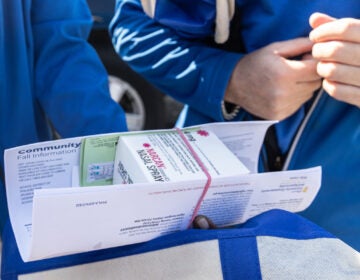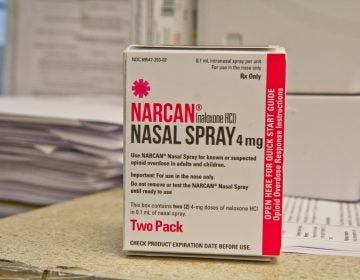‘It’s time for a Heart to Heart’: Philadelphia health department’s new campaign tackles substance use and heart health
The mission of the campaign is to spread educational messaging and conversation points about heart health and what additional factors lead to risk conditions.
Listen 0:56
Logo for the "Heart to Heart" campaign, created by the health department's Division of Substance Use Prevention and Harm Reduction. (courtesy of the campaign website)
From Philly and the Pa. suburbs to South Jersey and Delaware, what would you like WHYY News to cover? Let us know!
A new campaign by the Philadelphia Department of Public Health Division of Substance Use Prevention and Harm Reduction, or SUPHR, is giving Philadelphians the tools to have serious conversations with health care providers about the effects of stimulants on heart health.
The goal is to spread educational messaging and conversation points about heart health and what additional factors lead to risk conditions. It will also connect Philadelphians to low-barrier primary care resources and clinics across the city.
Dr. Daniel Teixeira da Silva, director of SUPHR, said this study has been in the works for the last few years, experimenting with talking points for clinicians to have conversations with their patients about heart health. Now, the blueprint includes having guiding talking points provided to the patients as well.
Da Silva said the initiative aims to have patients “think about how you really start talking about heart health and drug use with your doctor.”
The campaign’s website provides visitors with those resources as well as conversation starters to discuss with their primary care physicians, which will aid them in getting patients the proper care.
For those who do not have a primary care provider, the website also provides a list of clinics with walk-in hours for new patients, with a focus on locations in the ZIP codes that are most impacted by stimulant overdoses.
This will also be the department’s first-ever effort to provide advice to Philadelphians on the damage that stimulants can do to people’s hearts, and how these elements can lead to fatal overdose situations.
Who is most affected by stimulant use
A study by the department found that while overdose deaths have decreased by 19% among white people between 2019 and 2023, fatal overdoses have increased by 61% among the city’s Black population during that same period. Of those reported deaths, 80% involved some stimulant use, the department reported.
Recent city statistics show that while overdose deaths started to decrease in 2023 compared to the prior year, there was a larger decrease in fatalities among white residents, 15%, than there was among Black residents, who saw a 6% decrease.
The department found that the most stimulant-involved overdoses incidents have come from neighborhoods in the North, West and Southwest regions of Philadelphia. In 2023, the average reported age of Black men who died of a stimulant overdose was 52 years old, which is older than the average age of people who died of an opioid overdose.
What are stimulants?
According to the department’s website, stimulants, also known as “uppers,” are classified as drugs that speed up operations of the body’s central nervous system. They range from something as simple as a cup of coffee to prescribed medications like Adderall to illegal narcotics like cocaine and crystal methamphetamine.
When these stimulants are frequently consumed over a period of time, the effects can impact your heart’s rate per minute, raise your blood pressure and can lead to addiction. All of the above factors lead to heart diseases or overall heart failure.
Additional resources are provided on their website.
WHYY is your source for fact-based, in-depth journalism and information. As a nonprofit organization, we rely on financial support from readers like you. Please give today.






